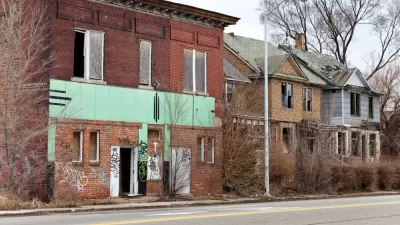Traditions must die hard in Detroit, where the region can't seem to shake its enduring geographic and racial divisions, reports Sarah Hulett.
The divisions that divide Detroit go back generations. Segregating events, like the Federal Housing Administration's discriminatory housing policies and the city's 1967 riots, continue to shape the economics and politics of Detroit into the present. Tensions between the city and its suburbs, and blacks and whites endure.
Although the region's demographics are changing, Hulett notes that, "the acrimony remains, and it's tangible any time there's a debate over regional cooperation between Detroit and its suburbs. Inside the city, residents fear a loss of political power. In the suburbs, the fear is that hard-earned tax dollars will be siphoned off by a poorly run city."
"It's a debate that's played out repeatedly through the years: over the city-owned water system that serves the suburbs, for example, and over the zoo and the convention center that serve the region but needed help staying afloat," says Hulett. Even the city's "gem," Belle Isle park, is close to slipping into the State's hands. "The proposal is part of a consent agreement between the state and the city intended to keep Detroit from sliding into bankruptcy," states Hulett. "But it's been derided by some...as yet another attempt by people outside Detroit to erode the city's self-determination."
Still, there is some hope for greater regional cooperation. "Last month, the majority of people in Detroit's suburbs voted to raise their taxes to keep the [Detroit Institute of the Arts] afloat."
FULL STORY: Racial, Regional Divide Still Haunt Detroit's Progress

Maui's Vacation Rental Debate Turns Ugly
Verbal attacks, misinformation campaigns and fistfights plague a high-stakes debate to convert thousands of vacation rentals into long-term housing.

Planetizen Federal Action Tracker
A weekly monitor of how Trump’s orders and actions are impacting planners and planning in America.

San Francisco Suspends Traffic Calming Amidst Record Deaths
Citing “a challenging fiscal landscape,” the city will cease the program on the heels of 42 traffic deaths, including 24 pedestrians.

Defunct Pittsburgh Power Plant to Become Residential Tower
A decommissioned steam heat plant will be redeveloped into almost 100 affordable housing units.

Trump Prompts Restructuring of Transportation Research Board in “Unprecedented Overreach”
The TRB has eliminated more than half of its committees including those focused on climate, equity, and cities.

Amtrak Rolls Out New Orleans to Alabama “Mardi Gras” Train
The new service will operate morning and evening departures between Mobile and New Orleans.
Urban Design for Planners 1: Software Tools
This six-course series explores essential urban design concepts using open source software and equips planners with the tools they need to participate fully in the urban design process.
Planning for Universal Design
Learn the tools for implementing Universal Design in planning regulations.
Heyer Gruel & Associates PA
JM Goldson LLC
Custer County Colorado
City of Camden Redevelopment Agency
City of Astoria
Transportation Research & Education Center (TREC) at Portland State University
Jefferson Parish Government
Camden Redevelopment Agency
City of Claremont



























